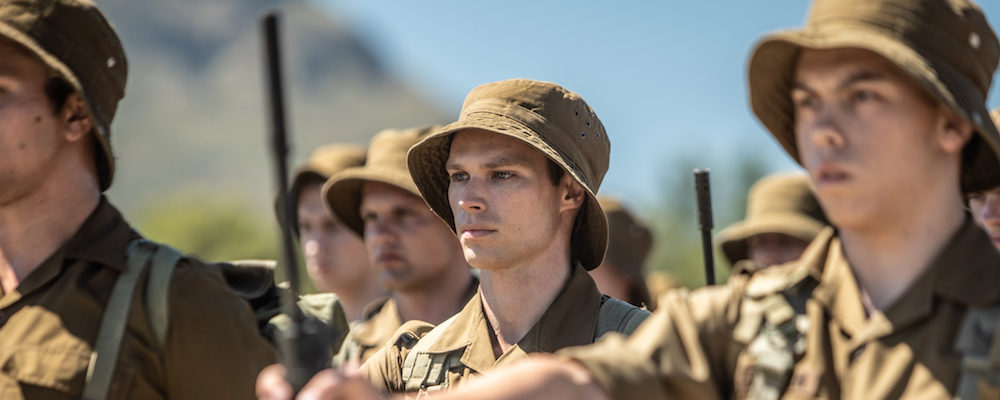‘Moffie’ Tells the Brutal Struggles of a Gay Teen in Apartheid-Era South Africa
Sandra Miska
A young military man’s journey as he comes of age and grapples with his sexuality is at the center of “Moffie,” a South African drama set during apartheid. Kai Luke Brummer gives an understated performance as Nicholas van der Swart, an 18-year-old in 1981 who is sent away to mandatory military training. In this environment full of toxic masculinity, he forms a tender connection with a fellow soldier, Dylan Stassen (Ryan de Villiers).
“Moffie” is based on the autobiographical novel of the same by André Carl van der Merwe, who drew from the journals he kept during his compulsory military service, and the film was helmed by Oliver Hermanus, an award-winning director who previously tackled LGBTQ issues in his feature “Beauty.” The term “moffie” is a derogatory Afrikaans term for a gay person. Under the apartheid regime, all white boys over 16 were required to serve their time with the South African Defense Force. But this is no glorified Boy Scout camp for the privileged, as these young men are put through a grueling ordeal before they are expected to guard the border shared with Angola, then a communist country. However, it becomes apparent that the threat from this poorer nation is over-hyped, as the real goal of the defense force is to keep the white minority government in control.
Nick and the others soon find themselves under the command of Sergeant Brand (Hilton Pelser), a major sadist who gets off on humiliating the young men, working them until they can barely stand, and throwing around the word “faggot” at every opportunity. Nick, an outsider because he’s English –– most of the others are Afrikaners, descendents from the original Dutch settlers –– grows close to Dylan, another sensitive boy and frequent target of Brand’s abuse. Despite their growing feelings, the two never cross over into a full physical relationship. They have reason to be fearful, as a pair of gay soldiers were both recently sent to the mental ward. They do spend a night together, and in many ways what develops between them seems to be more profound and deep than if they had had sex.
Things take a turn after Nick returns from a holiday and discovers that Dylan has been transferred, perhaps to the mental ward. He has to carry this internal torment with him when he is set to the warzone that is the border. The situation there is even more bleak than the hell that was boot camp. In one harrowing scene, Nick witnesses one soldier shoot up another with morphine. When offered some, Nick says no, claiming he’s not in pain, to which one of the men responds, “We’re all in pain.”
It should come as no surprise that this toxic world Nick in which finds himself in is also extremely racist. Until Nick goes to the Angolan border, we only see one Black person, some poor man sitting at a bench the others boys scream abuses at from the train to boot camp. While it might seem not right to make a film dealing with apartheid that doesn’t include any Black voices, it makes sense when one cosiders that a member of the ruling class like Nick would have little to no contact with anyone who wasn’t white. This segregation fuels his peers’ ignorance, hatred and fears, although we see no signs that Nick himself is actively racist.
In the middle of the film, we got a flashback scene of a traumatizing incident from Nick’s earlier years that led to his being more guarded about his sexuality and his shame issues. His parents, Suze (Barbara-Marié Immelman) and Miles (Michael Kirch), were still married at the time, but in present day, Suze is married to another man, Peet (Remano De Beer) an Afrikaner whose name Nick was forced to take, despite Miles still being in his life. Unfortunately, this renaming and its impact on Nick’s identity isn’t explored thoroughly enough.
“Moffie” releases April 9 in select theaters and on VOD.

